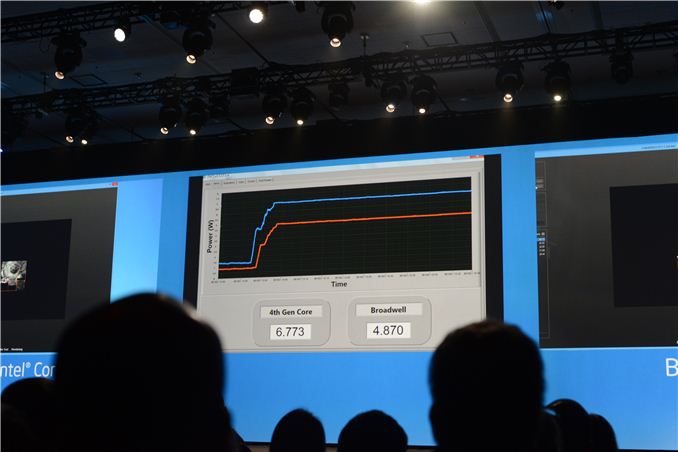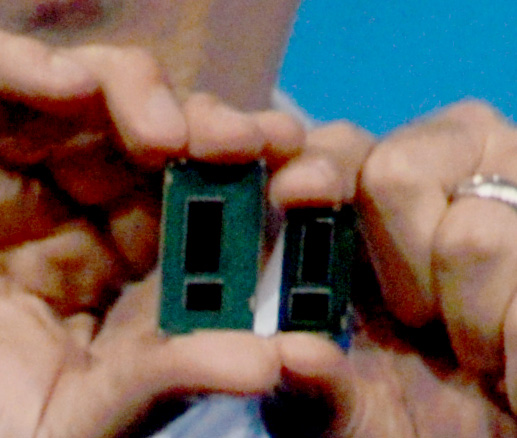Intel Demos 14nm Broadwell: Up to 30% Lower Power than Haswell
by Anand Lal Shimpi on September 11, 2013 12:42 PM EST
Intel just demonstrated 14nm Broadwell ULT (Y-series) silicon, normalized for performance against 22nm Haswell ULT (Y-series) silicon running a multithreaded Cinebench test. Intel was monitoring SoC power during the benchmark and demonstrated a ~30% reduction in power, at the same performance level.
The other reveal? Broadwell ULT, albeit still a two-die, single chip MCM, is physically smaller than Haswell ULT. A physical size reduction is necessary to get Broadwell into fanless tablet designs that can have competitive battery capacities to ARM based designs.

The first Broadwell silicon is supposed to ship to customers by the end of this year, and in systems next year.










38 Comments
View All Comments
toncijukic - Wednesday, November 20, 2013 - link
@deepi, How do you mean "no PCIe SSD in Europe"?tuxRoller - Wednesday, September 11, 2013 - link
Congrats. Looks like that device is close to macbook air levels.MrSpadge - Wednesday, September 11, 2013 - link
Still, better power efficiency directly equals better performance in TDP limited use cases, so they must not stop yet. Improving idle power consumption is a different story, of course.Stuka87 - Wednesday, September 11, 2013 - link
I am thinking once they do hit that "wall" of sorts, they can start raising clock speeds so you end up with better performance without any power increase over the previous gen.The last two generations performance has no change much. Just power decreases. So raising the clock speeds while maintaining power consumption will be what we see next.
EnzoFX - Wednesday, September 11, 2013 - link
Uhm, I don't think so. People aren't going to be like, OK now we have enough battery time...we don't need any more...Stuka87 - Wednesday, September 11, 2013 - link
EnzoFX: So you are saying people rather have 1% better battery life than 25% more performance?The rest of the computer uses more power than the CPU, so the CPU being more efficient will have less and less of an impact on battery life.
EnzoFX - Thursday, September 12, 2013 - link
But then the shift will be about power on load, no? Seeing as processors are using less power on idle, but still bordering what's allowed when on load. Performance will go up, as it's expected I would think, but they're not going to increase it just to do it when they have other things to market. I think it ties in to the plateau of performance. Of course I could have no idea what I'm talking about lol.
iwod - Thursday, September 12, 2013 - link
I was thinking and estimate in idle, Haswell is more like 0.3 to 0.5W where the LCD would be 2.5-3.5W instead. Then is another 0.3 - 0.5W for SSD, and 1W for Memory.At least Intel is working on Near Threshold Voltage, Memory Cube with even lower power, and some other improvement.
But in terms of CPU, Hell yes Broadwell is now finally entering ARM's range.
ananduser - Thursday, September 12, 2013 - link
Eagerly awaiting for the SVP 13" review.Hector2 - Thursday, September 12, 2013 - link
"I think we're getting quite close to the point where making the CPUs more power efficient won't help tremendously"Certainly in the tablet & laptop markets, ARM's strength's have been less power & less cost than Intel --- at the expense of not being software compatible and having lower performance. As Intel matches ARM's strengths while retaining their performance advantage, they start pulling ahead of ARM